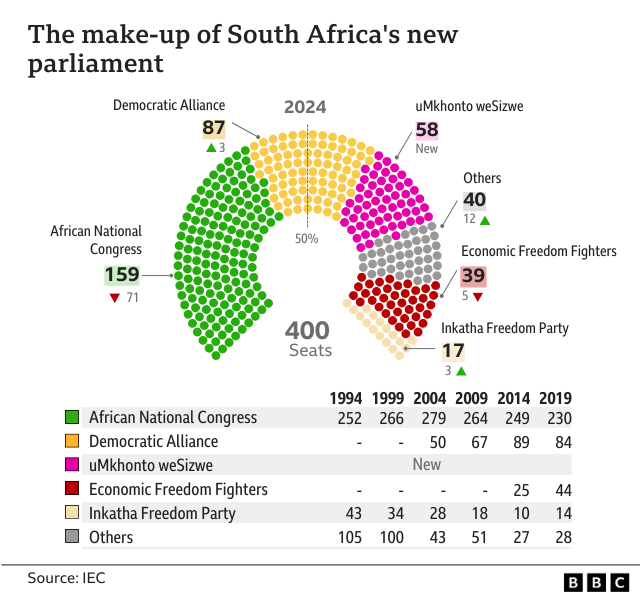The African National Congress (ANC), which governs South Africa, and the main opposition, the Democratic Alliance (DA), have agreed to form a national unity government.
This follows weeks of speculation about who the ANC would team up with after losing its parliamentary majority for the first time in 30 years in last month’s elections.
It obtained 40% of the votes, while the DA came in second with 22%.
The deal paves the way for ANC leader Cyril Ramaphosa to remain president.
The newly elected deputies will elect a president later on Friday, when the National Assembly meets for the first time since the May 29 elections.
They will meet at a convention center in Cape Town because the parliament complex has been damaged by fire several years ago.
ANC secretary-general Fikile Mbalula says the coalition agreement is on the right track and that the agreement with opposition parties is a “remarkable step”.
“Beyond this session, we are committed to what needs to be done to form the government of national unity. Our work does not stop,” he said.
An alliance between the center-right DA and the ANC is unprecedented as the two parties have been rivals for decades.
The ANC led by Nelson Mandela led the campaign against the racist apartheid system in 1994 and won the country’s first democratic elections.
Critics of the prosecution have accused it of trying to protect the economic privileges that the country’s white minority built up during apartheid – a charge the party denies.
DA leader John Steenhuisen said the deal was a “new chapter in our history”.
He told journalists that in exchange for the DA’s support for Mr Ramaphosa, the ANC would support the DA’s Annelie Lotriet as deputy speaker of parliament.
He also said the power-sharing agreement would involve cabinet positions for the DA, which has until now been an opposition party.
The agreement also includes the Inkatha Freedom Party (IFP), a conservative party with a strong Zulu base, which won 4% of the vote, and the Patriotic Alliance (PA), which attracts support from the community of color, such as people of mixed. breed are known in South Africa.
South African news site News24 says the deal also covers powerful local governments in the main provinces of Gauteng and KwaZulu-Natal.
Steenhuisen said: “Through the votes, the country has made it clear that it does not want one party to dominate our society.”
Although it is being billed as a Government of National Unity, the ANC has failed to get the third and fourth largest parties – former president Jacob Zuma’s uMkhonto weSizwe (MK) party and Julius Malema’s Economic Freedom Fighters (EFF) – come together.
The coalition agreement will probably be welcomed by the business sector, which thinks it will guarantee economic stability and prevent capital flight, as it does not include the EFF and MK, who advocate the nationalization of land, mines and banks.
MK had set Mr Ramaphosa’s resignation as one of the conditions for entering a coalition, which the ANC rejected.
Mr Malema said on Thursday night that the EFF had refused to join a government that included the DA, saying it was part of the “imperialist agenda”.
The ANC’s agreement with the DA and IFP is seen as an attempt to promote racial and ethnic reconciliation after a bruising election campaign.
President Ramaphosa has previously accused the DA – which draws its support mainly from racial minorities – of being “treacherous” and “reactionary”.
The ANC was deeply divided over a deal with the DA, with some of its senior leaders – supported by its allies in the trade union movement and the South African Communist Party (SACP) – preferring a coalition with the EFF and smaller parties or MK. .
But it was said that Ramaphosa preferred a coalition with the DA and IFP, seeing them as the most reliable partners in tackling South Africa’s economic crisis and deteriorating infrastructure.
One of the major obstacles will be the DA’s fierce opposition to the ANC’s efforts to create a welfare state – especially one government-funded national health servicewhich the Prosecutor’s Office rejects, saying it is too expensive and threatens the future of the private health sector.
The DA also strongly opposes the ANC’s black economic empowerment policies, seeing them as discriminatory against racial minorities while simply leading to the enrichment of the ANC’s corporate cronies – which the ANC denies.
While this agreement constitutes a significant step, Steenhuisen acknowledged that South Africa’s problems, such as crime and economic issues, would not be “resolved overnight” and that the “road ahead will be difficult”.



Go to BBCAfrica.com for more news from the African continent.
Follow us on Twitter @BBCAfricaon Facebook at BBC Africa or on Instagram at bbcafrica
































